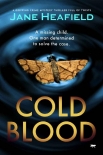Cold Blood - Jane Heafield (top 10 inspirational books .TXT) 📗

- Author: Jane Heafield
Book online «Cold Blood - Jane Heafield (top 10 inspirational books .TXT) 📗». Author Jane Heafield
Because the secret car park and the track had been created for those living in Lampton, they all knew there was no guard dog, and they all had the combination for the padlock. Bennet hadn’t been a resident but had visited Lorraine a number of times. After a decade, Liam didn’t expect the code number in his head to be correct or that Crabtree wouldn’t have changed it. He got a pleasant surprise.
A few minutes down this hedge-lined track, another led off it on the right, with a sign saying PRIVATE. OUT. YOU. KEEP. This would be the track to the Crabtrees’ farm. He drove past.
The secret car park was behind the Red Lion public house. It was enclosed by buildings on three sides, with a small alleyway between the close sides of the pub and the Yorkshire Bank – too thin for vehicles, thus making it off-limits to tourists. A concrete ramp up to the raised tarmac had been painted with STOP CLEAN WHEELS, which he disobeyed. The car park was only a third full, so he cut a few turns and circles to dislodge most of the mud from his wheels before parking far from the majority of his mess. Stepping in the car to stepping back out: fifty-one minutes.
The eternally gloomy alleyway between the pub and the bank delivered him into the south-western end of the rugby-ball-shaped village centre. The area was known as the Well and it struck him, again, how apt that was. Dead centre was a pond enclosed by a green area for picnicking, itself encircled by the road and then a ring of old buildings with modern frontages. An aerial view might give the impression of a shallow well perhaps two hundred metres wide that had mostly emptied to expose items cast to the bottom.
Ahead of him, past the green, the main road left the Well between the old grey library, with its nice rear garden that Liam still remembered fondly, and the Anderson’s supermarket, with its classy glass front and bright letters set against aged grey stone, like a young woman’s face transplanted onto an old lady’s head. Beyond these two buildings, Bennet remembered, the road curved out of sight, to run past an array of cheesy trinket shops, and reappeared above the edge of the Well as it climbed upwards towards the Porsche showroom, a Tesco, a church and a tiny school and the hotel. The place had hardly changed in the decade or so since he’d last seen it.
He crossed the road and dumped himself on one of the benches circling the pond to watch the village breathing. There was a black siren-style speaker atop the lamp post next to him, and he saw others dotted around the area. A civil defence system, given that the Well was effectively a sunken bowl and perhaps liable to flooding? It was a little strange that this area was covered by five or six small sirens instead of one large device. The system hadn’t been in place a decade ago.
It was a cold January, so the tourists were spread thin. Duos and threesomes and a scattering of families moved here and there, mixed with Lampton’s human furniture. He could instantly tell the two species apart, because the locals walked with a purpose, knowing where they were going and doing so on a timetable. The tourists ambled along with a constant look of awe on their faces, like lost children, as if city folk regarded quaint old England as another world. And they drew suspicious glances, like trespassers.
Amongst the locals, Bennet recognised a face here and there. He saw folks he’d been on low-level speaking terms with, and some he’d heard gossip about, but nobody he would have called a friend. Would anyone remember him from the – what, ten? – times he’d visited? Would he get the backslaps and handshakes of a returned kindred spirit, or the same sceptical glare accorded every other stranger? It was a long time ago.
So far, the latter appeared to be the order of the day. Eyes had run across him, then quickly moved on. Not even a double-take. It was a tourist spot, after all.
There was a fat man in a donkey jacket on a nearby bench. With shock, Bennet realised he recognised the guy. Crabtree, owner of a large portion of land to the east and one of the village chiefs, who became so by virtue of wealth, influence, or length of residence. The Crabtree in his memory had been a big ball of solid muscle from fifteen-hour days hauling weight on his farm; a lively, brash soul of the party who was rumoured to kill defective cattle with his bare hands. But the years had transformed the guy into a wreck. The former Hercules was vastly overweight, greatly aged, and stared at the pond with dead, zombie eyes. He didn’t look much like a Champion or Credit, or whatever term they’d used to denote the important clique amongst the clan. He also looked like a man who’d suffered a great loss.
Bennet stood up. Reminiscing about Lampton not only wasted time, it also felt awkward. He’d sometimes wondered if things might have progressed differently had he moved here instead of dragging Lorraine to Barnsley. But he hadn’t and his only connection to the village, Lorraine, was out of his life. He wasn’t here to catch-up or to remember the good times or imagine what might have been, but to find Lorraine and convince her to agree to see her son. So he’d





Comments (0)